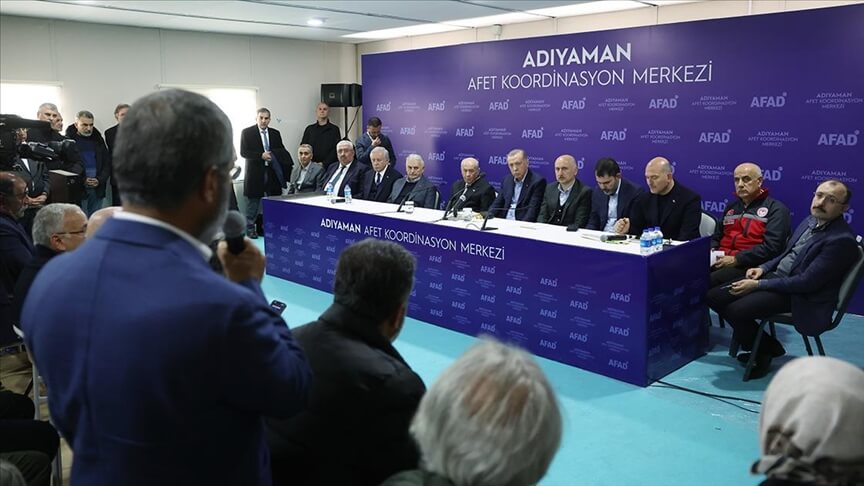Opposition parties and relatives of earthquake victims have sharply criticized Turkish President Recep Tayyip Erdoğan over his plea for forgiveness for delays in rescue efforts in one of the provinces hardest hit by two major earthquakes earlier this month, calling on the president to resign from office and face a full accounting for his actions.
The Feb. 6 earthquakes killed more than 44,000 people in Turkey and thousands more in neighboring Syria.
Erdoğan, who is seeking another term as president after two decades in power, has received strong criticism from earthquake survivors, especially those in Adıyaman in the country’s southeast.
“Due to the devastating effect of the earthquakes and the poor weather, we were not able to work the way we wanted in Adıyaman for the first few days. I apologize for this,” Erdoğan said on Monday.
“He asks for forgiveness. There is no forgiveness for killing your people. You did it, and you did it on purpose. You caused the death of nearly 50,000 citizens. How will you ask for forgiveness from a citizen who froze to death?” main opposition Republican People’s Party (CHP) leader Kemal Kılıçdaroğlu said on Tuesday during the CHP’s weekly meeting in parliament.
“Tens of thousands of people died screaming under the rubble, and the [Justice and Development Party] AKP chairman [Erdoğan] wants forgiveness. People will never forgive you. The people lost their lives because of you. What more should they give,” pro-Kurdish Peoples’ Democratic Party (HDP) co-chair Pervin Buldan said on Tuesday during the HDP’s weekly group meeting.
“You can’t turn a deaf ear to the voices calling for the resignation of the government. What you have to do is to accept responsibility and resign,” Buldan added.
Opposition Democracy and Progress Party (DEVA) leader Ali Babacan said on Twitter that Erdoğan could not absolve himself of responsibility merely by asking for forgiveness.
“How many people lost their lives due to the delays in the first 48 hours [after the earthquakes],” Babacan tweeted.
The opposition Homeland Party (MP), the Workers Party of Turkey (TİP) and the Labor Party (EMEP) also called on the government to resign in tweets responding to Erdoğan’s plea.
Erdoğan’s plea received an angry response from Turks on social media, including from survivors of the earthquakes.
“I called for help on Twitter for days, and no one heard my voice. I took my mother and father out of the rubble with my hands on Thursday, Feb. 9. My parents will not be able to see my graduation, my marriage or my child. I am an orphan. I do not forgive you,” one user tweeted.
“You left thousands of people to die. [On behalf of] my brother, my pregnant sister-in-law, my nephew who was a month away from turning 3, I do not forgive you. We will hold you to account,” tweeted another.
“In administrative law, there is a failure in service if the service is poor, late or nonexistent. If you are late with the service, it means you are at fault. The one at fault cannot ask for forgiveness; he or she must live up to his or her responsibility. If this is not the case, the administration can ask for forgiveness for every defect and get away with it,” Kerem Altıparmak, a human rights lawyer and former political science professor at Ankara University, tweeted.
Erdoğan’s apology has come in the wake of recent calls for his government’s resignation for failing to prepare the country against earthquakes, given the fact that it lies on major fault lines and is frequently struck by deadly temblors.
Although he admitted at the beginning that there were some shortcomings in the search and rescue efforts, he was mostly defiant until adopting an apologetic tone on Monday.
Last week, Erdoğan used harsh language against people who were criticizing his government for failing to distribute a sufficient number of tents to earthquake victims, referring to people asking about tents from Kızılay (Turkish Red Crescent) as “dishonest, immoral and vile.”
Turkish president’s handling of the biggest natural disaster in his two-decade rule could prove crucial ahead of tightly contested parliamentary and presidential elections, which were to be held on May 14 but could be postponed to June due to the earthquakes.

